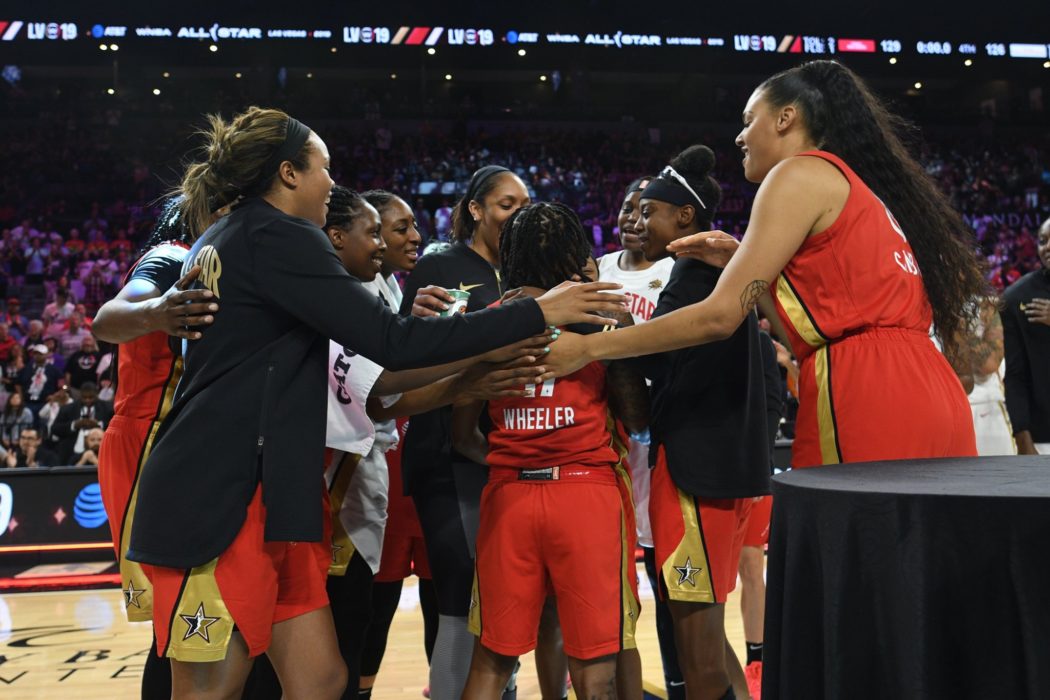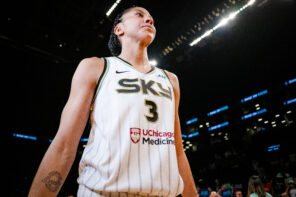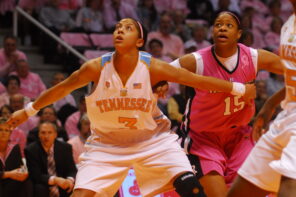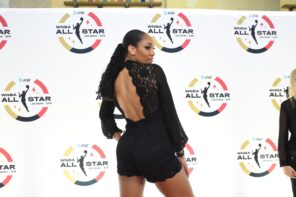We in the WNBA’s ecosystem sometimes sound like broken records when we tubthump for better treatment and coverage of the league, but as long as there is more work to be done, that work should be acknowledged.
The recent announcement of the more player-friendly collective bargaining agreement is a testament to WNBA players receiving better treatment overall. And with the sport of women’s basketball continuing its growth, that is being reflected in more coverage for the league.
Take for example the recent comments from Kobe Bryant. The Black Mamba is an unapologetic ambassador for the WNBA, and while his past with women is one that can be scrutinized, sliced and diced a million ways, his support of the W is, without question invaluable.
A CNN reporter asked him a question about his daughter having a future in the NBA. No. 8 (No. 24) took it in a different direction and said that there were three players he could see as being able to make the jump from the W to the Association.
Those three were Maya Moore, Elena Delle Donne and Diana Taurasi.
Moore is a four-time WNBA champion with the Minnesota Lynx who recently announced she will sit out the 2020 season (as she did 2019) to further her efforts in the fight for the release of Jonathan Irons relating to a supposed wrongful accusation and conviction after a shooting in a burglary case in Jefferson City, Missouri.
Taurasi is a three-time champion with the Phoenix Mercury and Delle Donne just hoisted her first WNBA title last season with the Washington Mystics.
In fairness to Bryant, I do not believe he meant what he said in a way to belittle the three he named or any other WNBA player. He is a robust support of the women of the W and more than likely will be courtside at a few Los Angeles Sparks games at Staples Center this season.
But Bryant’s remarks started a firestorm of social media discussion (and the expected misogyny) about WNBA players in the NBA.
Here is the thing – the ballers of the W do not need the comparisons of the NBA to validate itself. The WNBA has validated itself quite nicely. The talent pool the WNBA has never been better and with future phenoms such as Sabrina Ionescu, Lauren Cox, Chennedy Carter, Te’a Cooper, Ruthy Hebard, Crystal Dangerfield, Fran Belibi and Paige Bueckers ready to take over, the W is in great hands talentwise and will be for quite a while.
More and more are recognizing this and understanding that, so let’s not lay all of the blame on the Lakers great for the question. The question should have never been asked by the CNN reporter.
These remind me of the comparisons Brittney Griner and countless others received in the sunrise of their WNBA careers. In Griner’s case, the misogyny that followed and the “man” comparisons that ensued were not only pertaining to her basketball play.
What has to make one laugh are the constant tweets and Instagram posts from tough guys that believe a boys’ high school team (or better, them and four of their buddies) would stand a chance against any WNBA team. I would not want to see them on the same court one-on-one with a Kia Nurse, Diamond DeShields, Jewell Loyd, Sabrina Ionescu or a Paige Bueckers because I actually care about what happens to people’s ankles.
It may go something like this…
This cross still gets me 🤢 @cappa23
🎥: @wnba pic.twitter.com/BlN2PqHB0W
— WSLAM (@wslam) January 7, 2020
Or…
I think about this cross often 🤭 #TBT @Breezyyy14 @SLAMRewind
🎥: @wnba pic.twitter.com/NN3dbQpGpb
— WSLAM (@wslam) January 2, 2020
Oh…and one more for good measure?
Haley’s handles will get ya ❄️ @HaleyGorecki (via @DukeWBB) pic.twitter.com/Az1xHcGer5
— WSLAM (@wslam) January 7, 2020
We see this even in regular coverage of the league when WNBA players are compared constantly to their NBA counterparts. It would not hurt once or twice to compare today’s WNBA greats to … say … the original WNBA greats for a change.
And more seeing the WNBA as a validated league has a domino effect on the next group of young women looking to make their mark in women’s basketball. There’s nothing wrong with idolizing the NBA’s greats, but greater accessibility for the league on television will have more youngsters in middle school and high school saying they want to be the next Diana Taurasi, Elena Delle Donne, Maya Moore, Breanna Stewart, Candace Parker, Skylar Diggins-Smith, Nneka Ogwumike, Tina Charles, Jonquel Jones, Liz Cambage, A’ja Wilson, Brittney Griner, Allie Quigley, Teaira McCowan, Angel McCoughtry, etc.
Remember – that was not even something we could say towards the end of the millennium because there was no WNBA until 1997 (even though there were other women’s leagues). Instead of asking the “can they play in the NBA” question in regards to the W, let us have more discussions about one place where it is a bit more appropriate for the WNBA’s greats to take their place alongside those of the NBA and other basketball leagues.
The Naismith Memorial Basketball Hall of Fame.




